Non-Invasive Testing With Jeremy Davis
Chat with MASLD AI

Hi, I am MASLD AI.
Suggested Questions :

MASLD AI 08:24 PM

Join Jeremy Davis, NP, for a clear, clinic-ready walkthrough of non-invasive testing for MASLD/MASH. Using a real case, Jeremy shows how to risk-stratify patients starting with FIB-4 and when intermediate scores should trigger liver stiffness measurement. Learn practical cutoffs, image-quality checkpoints (valid measures, IQR/median), and common confounders (ALT/AST flares, cholestasis, recent meals, alcohol, obesity, ascites) that can overestimate stiffness. He contrasts pros/cons of VCTE vs. MRE, explains how to pair ELF with FibroScan, and maps decisions to AGA/AASLD-aligned pathways—who to refer, who to monitor, and how often to re-stage. The session closes with actionable counseling on lifestyle, weight loss targets, and cardiometabolic risk control to slow fibrosis progression while minimizing unnecessary biopsies.
Related Podcast
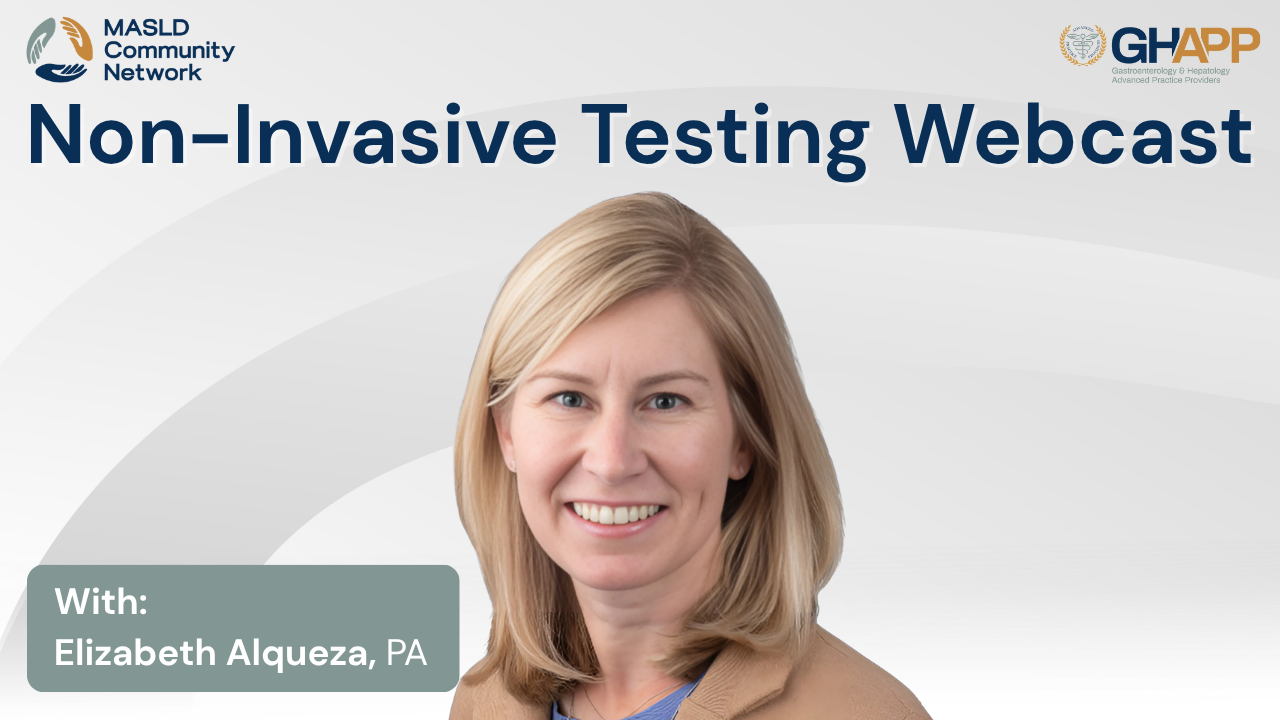
Non-Invasive Testing With Elizabeth Alqueza

In this session, Elizabeth Alqueza, PA-C at Beth Israel Deaconess Medical Center, provides a comprehensive overview of non-invasive testing in patients with Metabolic Dysfunction–Associated Steatotic Liver Disease (MASLD) and MASH. Using a real clinical case, she explains how to evaluate patients with abnormal liver enzymes and steatosis on imaging, and how to apply widely used tools such as the FIB-4 score, ELF test, FibroScan (VCTE), CAP score, shear wave elastography, and MR elastography. Elizabeth highlights the strengths, limitations, and interpretation of each test, along with practical considerations like cost, accessibility, patient factors, and operator experience. She also reviews the MASLD care pathway, emphasizing how accurate staging with non-invasive tests helps identify at-risk patients with advanced fibrosis who need closer monitoring, lifestyle interventions, and specialty referral. This talk underscores the critical role of non-invasive assessment in preventing progression to cirrhosis, liver failure, and hepatocellular carcinoma.
Watch Now
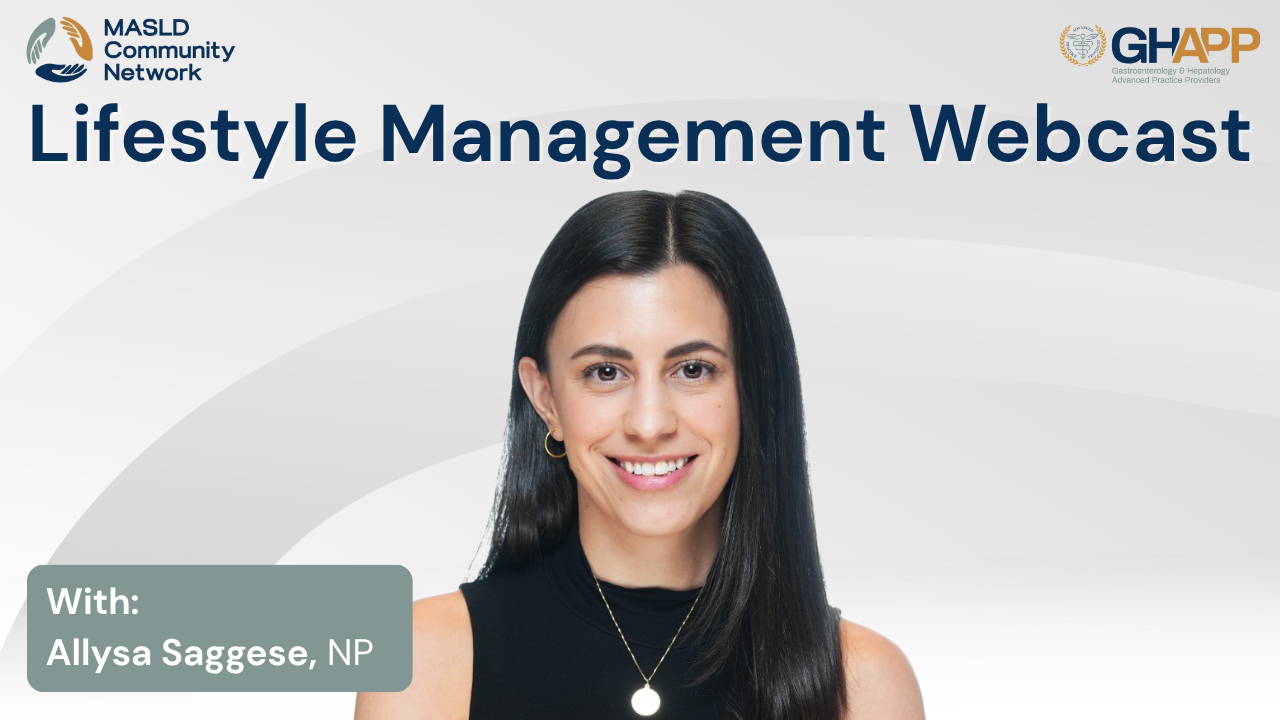
Lifestyle Management With Allysa Saggese

Join Allysa Saggese, NP, from Weill Cornell Medicine in New York City, for an insightful and practical discussion on lifestyle management for MASLD and MASH, presented through the GHAPP MASLD/MASH Community Network, sponsored by Madrigal Pharmaceuticals. In this case-based presentation, Allysa walks viewers through the non-pharmacologic strategies used to manage Metabolic Dysfunction-Associated Steatotic Liver Disease (MASLD), highlighting the role of nutrition, physical activity, and patient-centered counseling. Using a real-world example of a 65-year-old patient with obesity, diabetes, and steatosis, Allysa demonstrates how to assess fibrosis risk through non-invasive testing like FIB-4 and FibroScan, and explains how lifestyle modifications remain central to slowing disease progression—even in the era of advanced therapeutics. The session explores the importance of motivational interviewing, cultural dietary preferences, and how to structure effective, individualized conversations around reducing sugar intake, increasing movement at home, and achieving sustainable 5–10% weight loss to improve liver histology. Allysa also breaks down the metabolic interplay between central adiposity, insulin resistance, and liver inflammation, and shares counseling tips to build patient trust and long-term engagement. Whether you're a GI or hepatology provider, this session delivers real-world guidance to help empower patients to reverse early liver damage through everyday lifestyle changes.
Watch Now

APP Insight: Common Questions from Community GI About MASH

In this informative video, Janet Gripshover, DNP, FNP-BC, and nurse manager for the liver transplant program at Cedars-Sinai, answers key questions about managing MASH (Metabolic Dysfunction–Associated Steatohepatitis) and navigating non-invasive testing. She addresses a common clinical challenge—what to do when FIB-4 and FibroScan results are discordant. Janet explains that while non-invasive tests are useful, they're not foolproof, and when results are unclear—especially in patients with significant metabolic risk factors—liver biopsy remains the gold standard for accurate diagnosis. She also shares expert recommendations on dietary changes for patients with fatty liver disease, emphasizing alcohol avoidance, high-protein, low-fat, and lower-carb diets, as well as achievable weight loss goals (around 5% of body weight). Janet highlights when to escalate care beyond lifestyle interventions—typically after 3 to 6 months if there’s no improvement—and discusses options such as pharmacologic therapy or bariatric surgery. This video provides practical, evidence-based guidance for healthcare providers managing the complexities of MASLD and MASH.
Watch Now
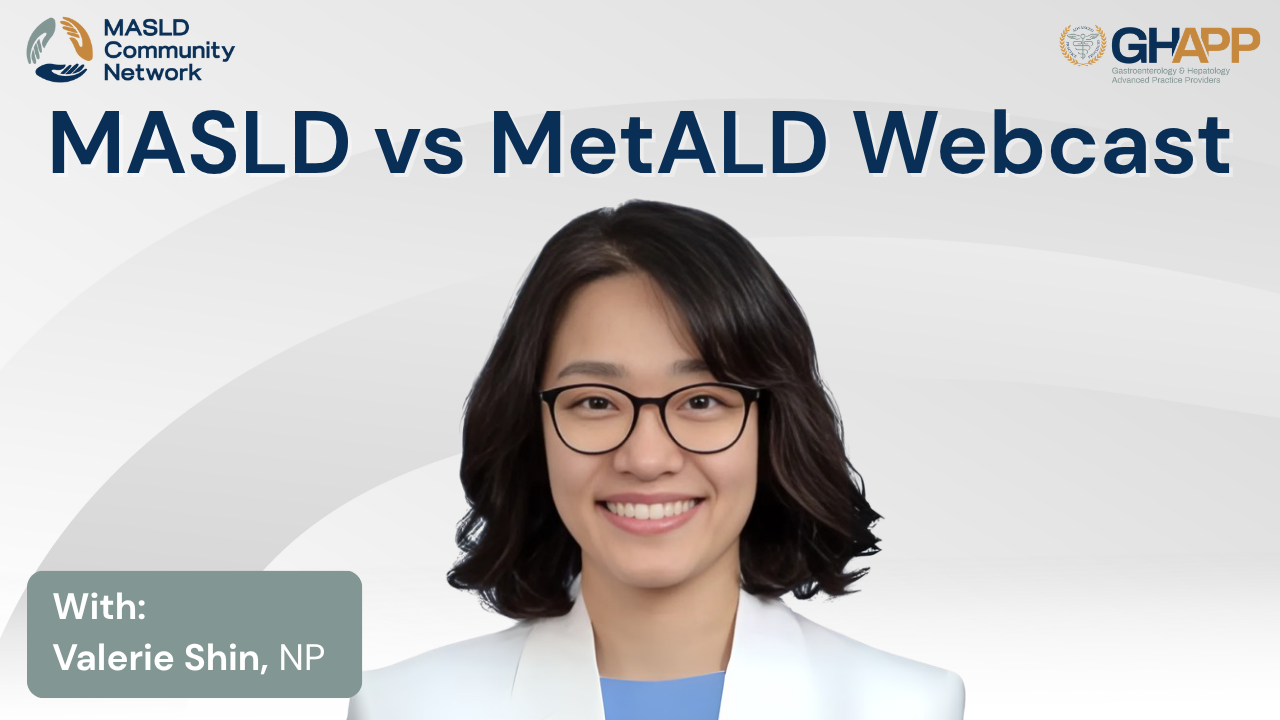
MASLD vs MetALD With Valerie Shin

Valerie Shin, NP from UCLA Health’s Pfleger Liver Institute, hosts a clear, practical overview of MASLD, MASH, and mixed-etiology MET-ALD for the GHAPP MASLD Community Network (sponsored by Madrigal). Through a common patient case, she explains how to recognize steatotic liver disease, why getting an accurate alcohol history matters, and how non-invasive tools (like FibroScan and alcohol biomarkers) help confirm what’s driving liver injury. You’ll hear straightforward guidance on counseling patients: heart-healthy/Mediterranean-style eating, sustainable weight loss, regular aerobic and resistance exercise, and complete alcohol cessation—plus when to consider specialty referral and ongoing surveillance. Perfect for APPs and GI clinicians seeking a simple, patient-centered approach to preventing progression from fatty liver to advanced disease.
Watch Now
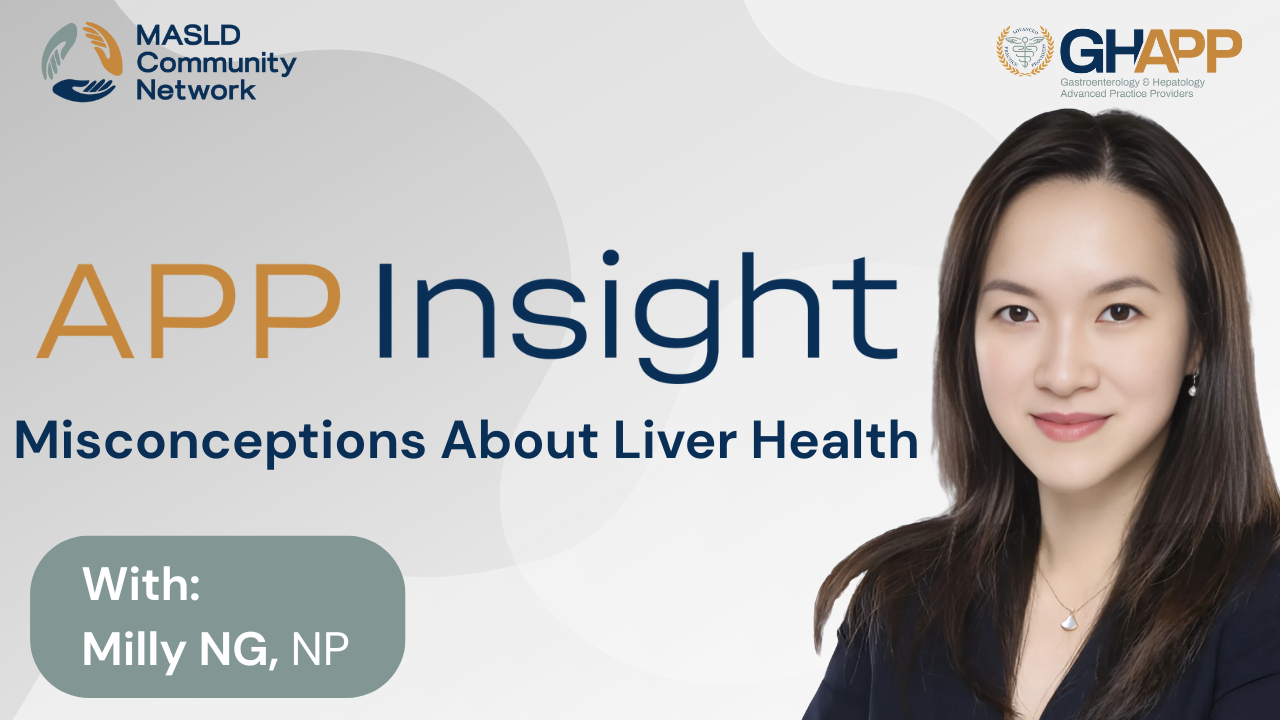
Misconceptions About Liver Health

In this short and informative video, Miu Lai Ng, a nurse practitioner at Tufts Medical Center, debunks two of the most common myths about liver health. First, she sets the record straight on liver cleanses and detox teas—explaining that your liver already detoxifies your body daily and doesn’t need fad diets or trendy supplements. Instead, what your liver needs is support through sustainable habits like reducing alcohol intake, cutting back on processed sugars, and maintaining a healthy weight. She also highlights a critical point: liver disease is often silent, and many people with significant liver damage have no symptoms until it’s advanced. If you're at risk due to metabolic syndrome, alcohol use, or other factors, Miu Lai urges you to talk to your healthcare provider about screening options like FIB-4 or FibroScan®. Your liver works hard for you—this video is a reminder to return the favor with real, lasting care.
Watch Now
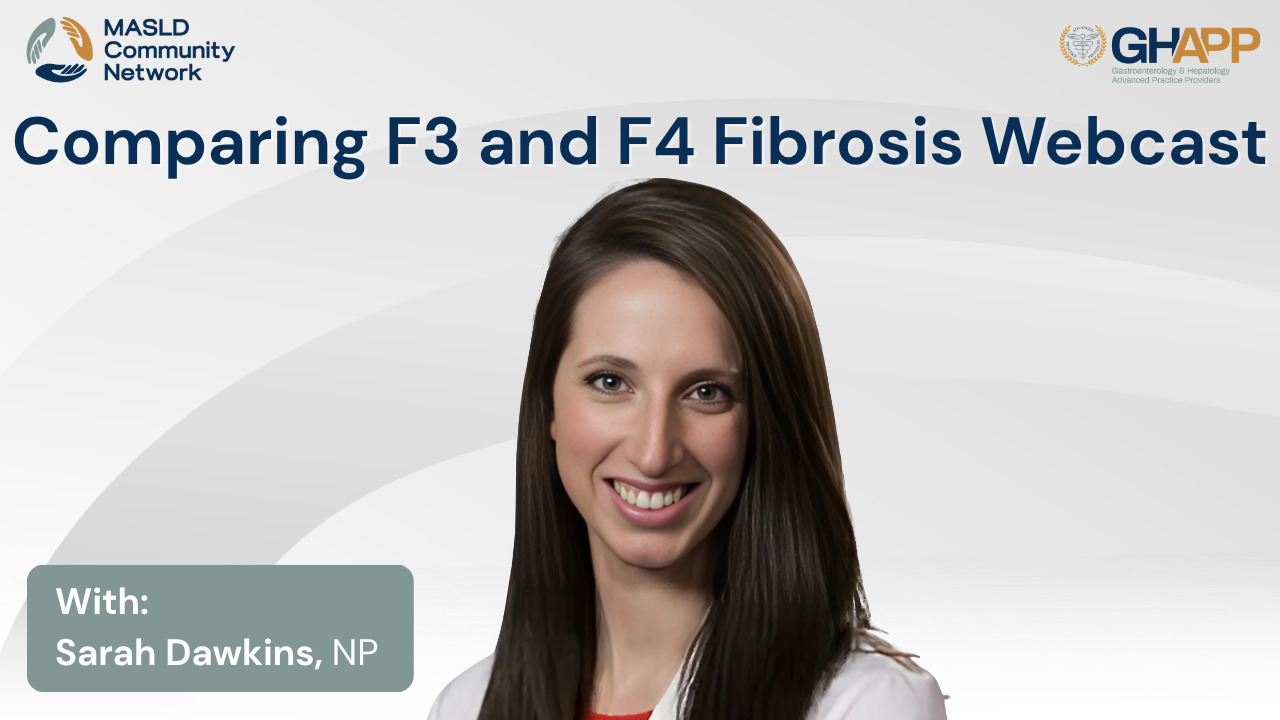
Comparing F3 and F4 Fibrosis with Sarah Dawkins

In this educational session from the MASLD Community Network, Sarah Dawkins, NP, from Duke University Medical Center, explores the critical differences between F3 and F4 fibrosis in patients with MASLD and MASH. Through real patient case studies, she highlights how non-invasive testing methods—such as FIB-4, FibroScan, ELF testing, and imaging—play a vital role in accurately staging fibrosis and guiding treatment decisions. The discussion also covers the impact of metabolic risk factors like type 2 diabetes, obesity, and hypertension, along with strategies for management that include lifestyle modifications, weight loss goals, GLP-1 therapy, and the use of resmetirom (Rezdiffra) for eligible patients. Sarah emphasizes the importance of HCC surveillance, esophageal varices screening, and ongoing monitoring to improve outcomes for patients with advanced liver disease. This session underscores why distinguishing between F3 and F4 fibrosis is essential in clinical practice and how non-invasive testing can support timely diagnosis, treatment, and long-term care planning.
Watch Now
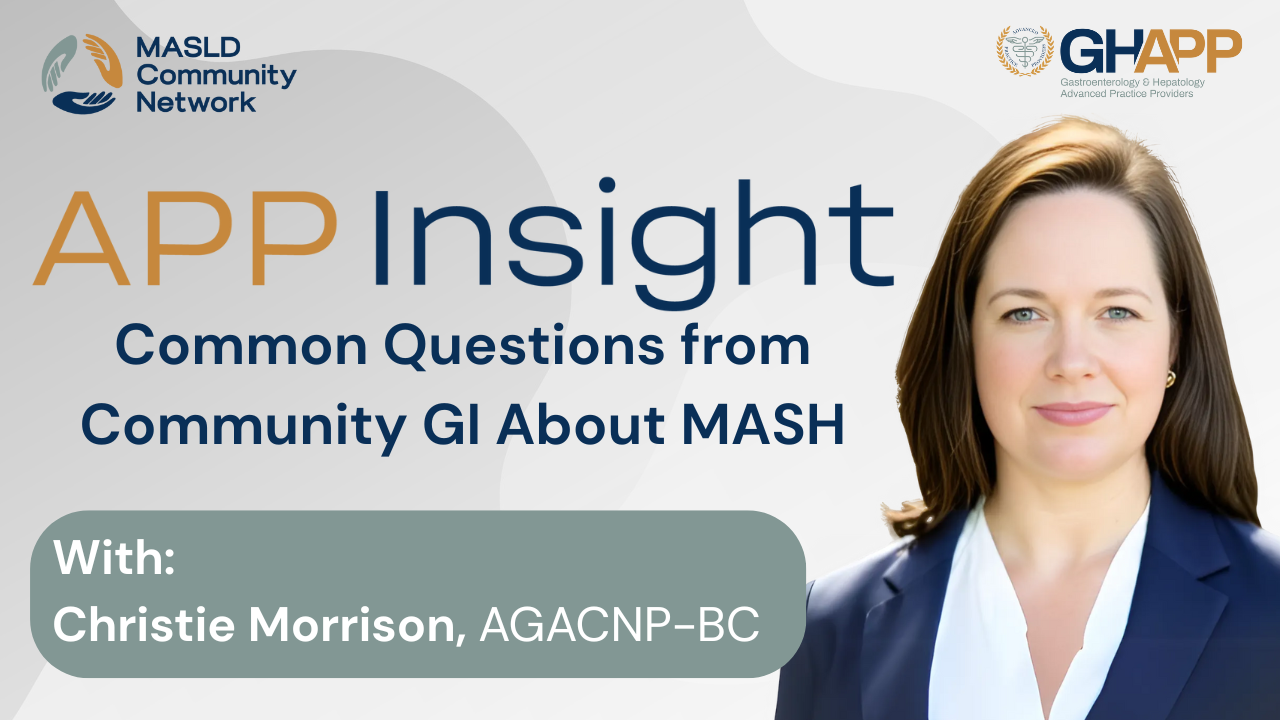
Common Questions from Community GI About MASH

In this insightful video, Christie Morrison, a local advanced practice provider with the GHAPP MASLD/MASH Community Network, answers two of the most frequently asked questions from community GI providers: when to refer patients with MASH to a transplant center and how to evaluate liver fibrosis when FibroScan® isn’t accessible. Christy emphasizes the importance of using non-invasive testing (NITs)—including FIB-4 and ELF (Enhanced Liver Fibrosis) scores—to help identify patients with F3 fibrosis, who are at higher risk for rapid progression to cirrhosis and hepatocellular carcinoma (HCC). She encourages early referral to transplant hepatology to avoid delays in care, especially given long wait times and the value of multidisciplinary support teams at transplant centers. For clinicians without access to FibroScan, Christy shares practical alternatives such as ordering reflex testing to ELF via major labs and leveraging easy-to-use digital tools like MDCalc for FIB-4 calculation. This episode is a valuable resource for GI providers looking to optimize liver care pathways and prevent late-stage complications in MASLD and MASH patients.
Watch Now
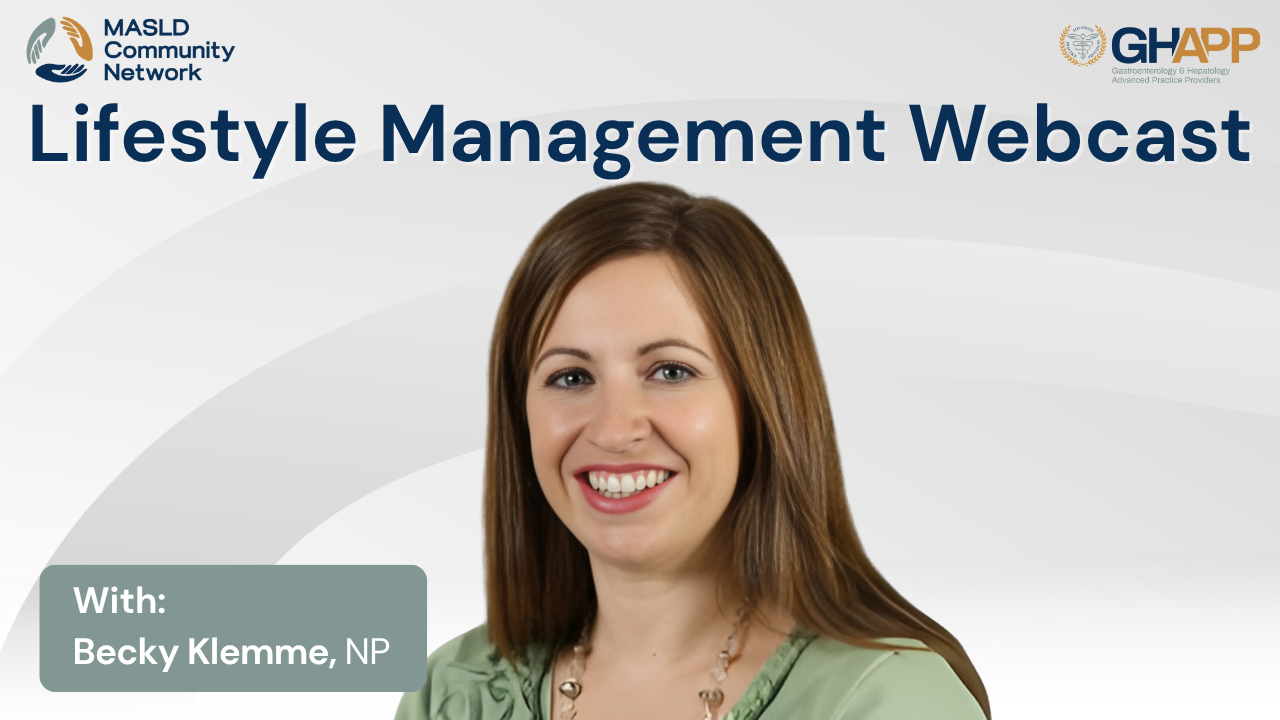
Lifestyle Management With Becky Klemme

In this educational session, Becky Klemme, NP from Sioux Falls, South Dakota, shares over a decade of hepatology experience to highlight lifestyle management for patients with Metabolic Dysfunction–Associated Steatotic Liver Disease (MASLD). Formerly known as NAFLD, MASLD is now the most common chronic liver disease worldwide, closely linked to obesity, type 2 diabetes, hypertension, and cardiovascular disease. Through a detailed patient case, Becky explains how to evaluate MASLD using labs, imaging, and non-invasive tests like FIB-4 and FibroScan, and how to distinguish between simple steatosis, steatohepatitis (MASH), and advanced fibrosis. She outlines practical strategies for dietary changes, exercise, weight loss goals, and metabolic risk reduction—all while keeping patient-centered, culturally sensitive care in mind. Viewers will also learn about the pathogenesis of MASLD and MASH, the role of genetics and lifestyle, and evidence-based approaches such as the Mediterranean diet, structured physical activity, behavioral counseling, and the 5A framework for patient engagement. With obesity and diabetes on the rise, early recognition and proactive lifestyle intervention are essential to preventing progression to cirrhosis, liver failure, or hepatocellular carcinoma (HCC). If you are a hepatology provider, APP, or clinician managing patients with fatty liver disease, this session offers actionable insights and patient care strategies you can use in practice.
Watch Now

Podcast: Alcohol and MASLD/MASH: Navigating the Complex Relationship

In this powerful and highly educational episode, Scott Springer, PA-C at Erie County Medical Center in Buffalo, NY, explores the complex and often overlooked relationship between alcohol use and metabolic dysfunction–associated steatotic liver disease (MASLD/MASH). Drawing from his dual expertise in hepatology and addiction medicine, Scott outlines the importance of accurately assessing alcohol use when diagnosing MASLD, MASH, MetALD, or ALD—emphasizing that MASLD and MASH are diagnoses of exclusion and heavily influenced by alcohol consumption thresholds. He discusses best practices for screening, including patient-centered, nonjudgmental interviewing, the use of biomarkers like PEth and urine ethyl glucuronide, and how these tools enhance accuracy and accountability in care. Scott reviews national guidelines that recommend alcohol abstinence for patients with chronic liver disease and presents data showing how even small reductions in alcohol use can significantly lower the risk of cirrhosis. He also unpacks the challenges of interpreting liver tests in patients with ongoing alcohol use, the limitations of non-invasive testing like FibroScan and FIB-4, and how alcohol may disqualify patients from emerging pharmacotherapy such as resmetirom. Finally, he highlights the promising potential of GLP-1 medications in managing both liver fibrosis and alcohol use. This episode is essential listening for hepatology providers, addiction specialists, and any clinician involved in the care of patients with coexisting liver disease and substance use disorders.
Watch Now
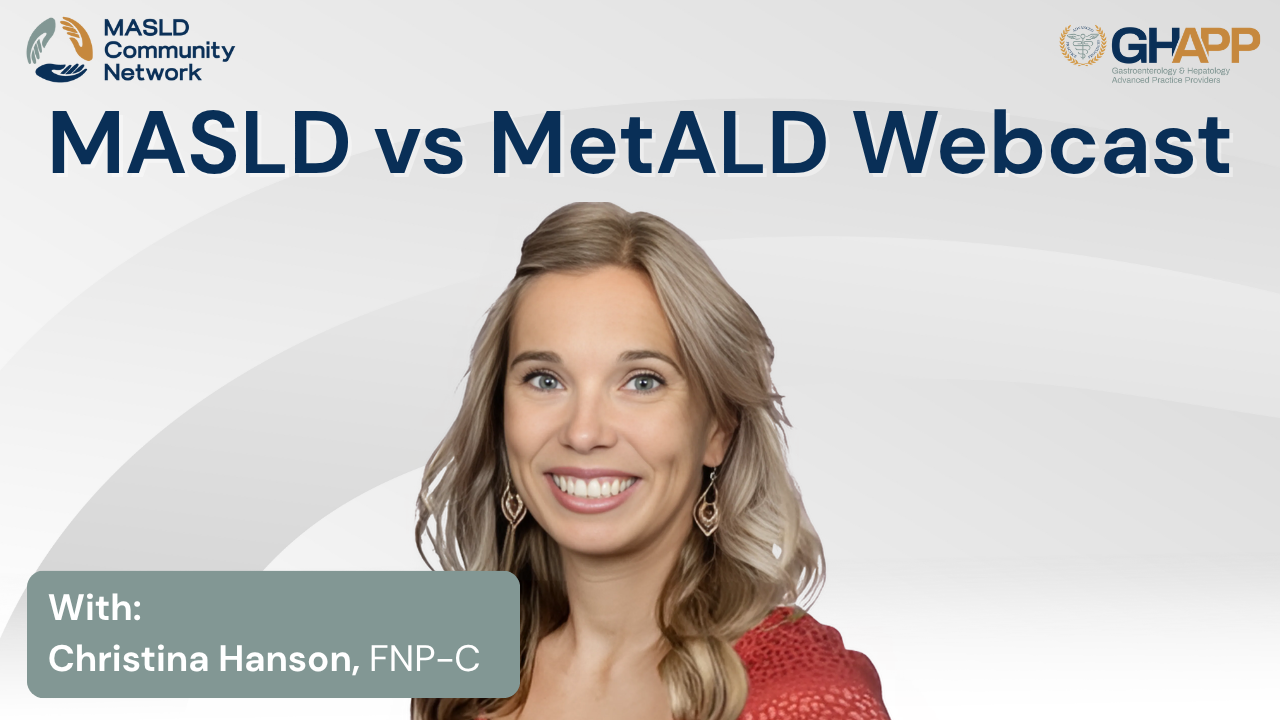
MASLD vs MetALD With Christina Hanson

Discover the latest insights on MASLD and MetALD in this educational session from the GHAPP MASLD Community Network. Christina Hanson, FNP-C, walks through a real-world case study to highlight how common metabolic conditions like hypertension, hyperlipidemia, obesity, and PCOS intersect with alcohol use to drive liver disease progression. The session explores updated nomenclature replacing NAFLD/NASH, the role of FibroScan and elastography in staging fibrosis, and the importance of screening patients with metabolic risk factors for fatty liver. Learn how alcohol consumption contributes to liver injury, triglyceride elevation, and blood pressure changes, and how objective biomarkers such as PEth testing are transforming diagnosis beyond self-reporting. Christina also reviews lifestyle interventions, dietary strategies like the Mediterranean diet, and current treatment considerations for patients with advanced fibrosis (stage 3), including when to initiate HCC screening. Whether you are a hepatologist, GI specialist, or advanced practice provider, this session provides practical tools for evaluating and managing patients with MASLD, MetALD, and related liver health challenges.
Watch Now





 September 2025
September 2025 